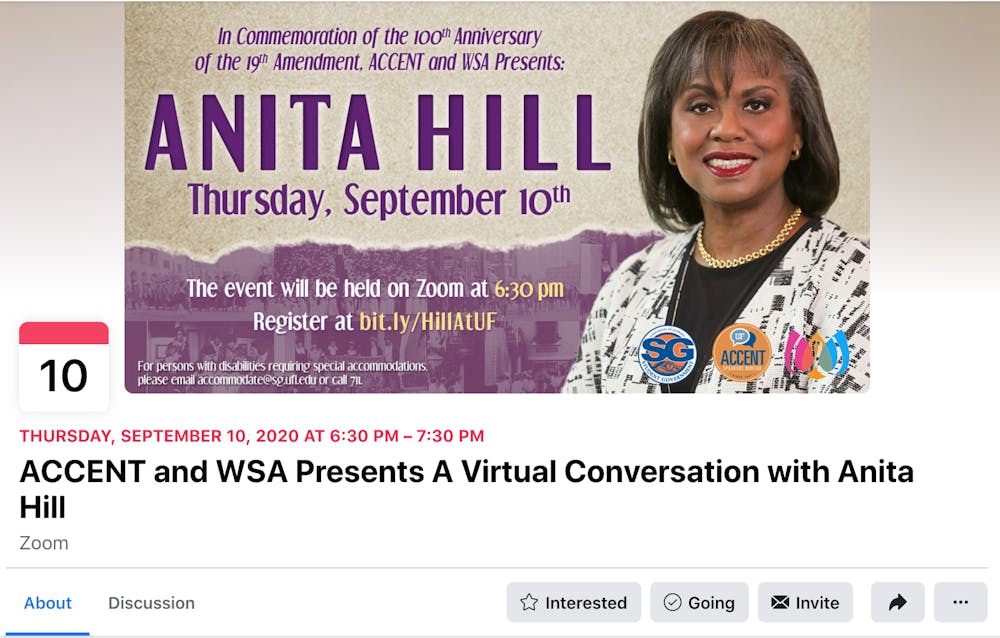Anita Hill, a lawyer, women’s rights activist and Brandeis University professor, believes 2020 is the year of vision, where the nation began to see each other's suffering.
“What’s causing us to be in peril are a host of disparities that exist in institutions,” Hill said.
Education in the fight for racial justice and similar topics were among the points Hill discussed in front of thousands of UF students during an hour-long event over Zoom Thursday night.
UF Accent Speakers Bureau and Women’s Student Association hosted Hill to commemorate the 100th year anniversary of the U.S. Constitution’s 19th Amendment, which secured white women’s right to vote.
Debra Walker King, a UF English professor and ordained minister at Greater Bethel African Methodist Episcopal Church, guided the conversation with questions for Hill. The event ended with questions from the audience.
King and Hill were the only two faces on the Zoom and audience questions were submitted and read by the moderator.
Up to 3,000 attendees were able to watch the conversation. It is unclear how many logged in. Hill was paid $30,000 in student fees for the speaking event.
Hill began the conversation by reminding the audience that the 19th Amendment was meant to secure equal voting rights for women but left out women of color.
“Native women and Asian women weren’t even considered citizens, but through persistence we now have something to celebrate, all of us who march to the polls to vote,” Hill said.
Hill currently teaches as a women’s studies, social policy, African and African American studies and law professor at Brandeis University, a private research university in Massachusetts, according to the university's website.
Hill made workplace sexual harassment a nationally recognized issue in 1991, and she discussed being one of the early women in the #MeToo movement. She testified before the U.S. Senate Judiciary Committee about the sexual harassment she said she endured from Clarence Thomas, a Supreme Court nominee and her former supervisor.
Former Vice President and Democratic presidential nominee Joe Biden conducted the Senate Judiciary Committee hearing where Hill testified in 1991. He has since apologized to Hill for her treatment at the hearing and for not allowing additional witnesses against Thomas to testify.
Hill endorsed Biden’s candidacy for president on Friday.
Throughout the event, Hill emphasized the need for intersectionality in fights against systems like racism and misogyny.
One of the steps in reaching allyship between oppressed people is to learn the history of oppression and the fight against it, she said.
“One of the ways that is changing is that all of us are learning the real history of movement in this country, whether that be the gender movement or the race movement,” she said.
Hill and King talked about the barriers to that education, such as President Trump’s memo to cancel diversity and critical race theory training in federal agencies.
Hill said without the training teaching people and businesses the benefits of diversity, there would not be the massive-scale movement for Black lives in the country today.
Hill hopes the Confederate statues being removed across the U.S. as a result of the Black lives matter movement will be replaced with monuments to those who fought for equality.
“We need to foster more learning, we need to tell the truth about our history and who has contributed to justice in our history,” she said.
One audience member asked Hill how she hopes her own history will be remembered. She said that her legacy will ultimately be written by someone else, so she must live the life she wants someone to write about.
“You live your legacy and I do live my work,” Hill said. “The work is to make the world safer, to make it more fair for people, to make it more just.”
Anita Hill spoke to UF in a 45-minute virtual interview Thursday. The event was be moderated by Debra Walker King, a UF English professor, and was hosted by Accent Speakers Bureau and the Women’s Student Association.
Lianna Hubbard is a reporter for The Alligator’s Investigative Team. The UF women’s study major began as a freelance reporter three years ago. She founded her community college’s award-winning newspaper before beginning at The Independent Florida Alligator. See an issue in your community or a story at UF? Send tips to her Twitter.






